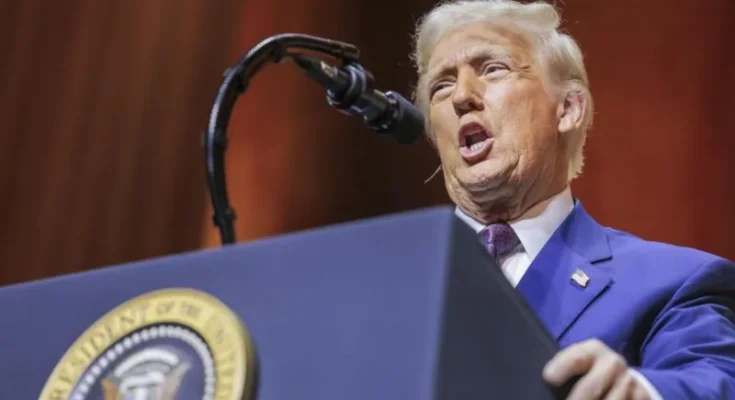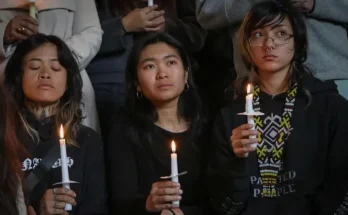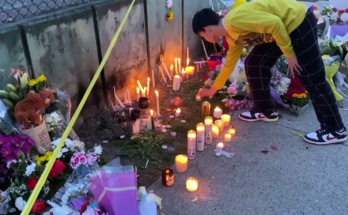Donald Trump has been back in the White House for a month.
His fifth week in office saw more dramatic moves as the president continued on his plan to remake the federal government, implement sweeping cuts and reshape American foreign policy.
This week he called Ukraine’s war-time president a “dictator”, pledged to make IVF more affordable and dismissed his highest-ranking military officer.
If you’re after a catch-up, here is a reminder of 19 major moves from the Trump administration this week.
1. Trump Calls Ukraine’s Zelensky a “Dictator”
In a fiery exchange on Tuesday, President Trump branded Ukraine’s President Volodymyr Zelensky a “dictator” amid escalating tensions between the two leaders. This remark followed a heated back-and-forth regarding the war in Ukraine, during which Trump also appeared to lay blame on Ukraine for Russia’s invasion.
Trump’s comments came after Zelensky criticized US-Russia talks about the war, from which Kyiv had been excluded. In response, Zelensky accused Trump of “living in a disinformation space” controlled by Moscow after Trump claimed the Ukrainian leader’s approval rating had plummeted to just 4%—a figure Zelensky said was being circulated by Russian sources.
Zelensky, whose term was scheduled to end in May 2024, has seen his country remain under martial law since Russia’s full-scale invasion began three years ago, with elections put on hold.
The “dictator” label drew sharp rebukes from European leaders, including German Chancellor Olaf Scholz, who described Trump’s comments as “simply wrong and dangerous.”
2. Met Russian Officials for Peace Talks Without Kyiv
On Tuesday, US and Russian officials held their first high-level, in-person talks since the start of the war in Ukraine—but Kyiv was notably excluded from the discussions.
The meeting, which took place in Saudi Arabia, raised concerns in Ukraine that their interests were being sidelined in peace negotiations. Ukrainian officials expressed frustration at being left out of talks about their own country’s future, especially after enduring years of conflict with Russia.
In an interview on Friday with Fox News, Trump downplayed the significance of Zelensky’s absence, asserting that it was not essential for the Ukrainian president to be at the peace talks. He added, however, that he would “of course” take a call from Zelensky if necessary.
US Secretary of State Marco Rubio supported the peace talks, calling them a crucial first step toward negotiating a potential resolution. He emphasized that no decisions would be made without Ukraine’s involvement, reassuring Kyiv that any deal would not be imposed upon them.
3. Swapped Prisoners with Russia
In a significant diplomatic move, Russia released a US national, Kalob Byers, who had been detained at a Moscow airport earlier this month for cannabis possession. Byers, 28, was freed just hours before the high-level talks between US and Russian officials over the war in Ukraine were set to take place.
In return, the US announced it would release Russian national Alexander Vinnik, who had been arrested in 2017 on charges related to laundering billions of dollars through the cryptocurrency Bitcoin. This prisoner exchange was part of a broader deal that also saw American schoolteacher Marc Fogel return home last week after being held in Russia for years.
The swap, while symbolizing a rare moment of cooperation between the US and Russia, has raised questions about the broader context of US-Russian relations and its potential impact on ongoing peace negotiations.
4. Ended New York’s Congestion Charge
The Trump administration took a bold step this week by moving to end New York City’s congestion pricing plan, which had been introduced just last month. The plan charges vehicles entering designated areas of the city, using the tolls to fund upgrades for New York’s aging public transit systems.
Trump made his position clear, declaring on social media: “CONGESTION PRICING IS DEAD. Manhattan, and all of New York, is SAVED. LONG LIVE THE KING!” His statement was a direct challenge to the new policy, which had garnered support from city officials seeking to tackle traffic and improve public transportation.
New York Governor Kathy Hochul quickly responded, emphasizing the rule of law. “We are a nation of laws, not ruled by a king. We’ll see you in court,” she said, signaling the state’s intent to fight the federal move in the legal arena.
5. Told Not to Interfere in Andrew Tate’s Case by Alleged Victims
Four women who have accused social media influencer Andrew Tate of sexual abuse expressed serious concerns after reports surfaced that US officials had asked Romania to ease travel restrictions on Tate and his brother, Tristan Tate. The brothers, both of whom hold dual UK-US nationality, have been involved in a criminal case in Romania.
The Financial Times reported that US officials raised the issue with the Romanian government last week, and the conversation was reportedly followed up by Trump’s envoy, Richard Grenell, over the weekend.
One source claimed that the US had requested the return of the Tate brothers’ passports, allowing them to travel while awaiting the outcome of the criminal case against them.
The alleged victims, however, were “extremely concerned” by these developments, urging the US government not to interfere in the legal process. The US State Department has yet to respond to inquiries from the BBC regarding the matter.
6. Touted Drop in Border Arrests
The US Border Patrol reported a significant drop in migrant arrests at the US-Mexico border in January, with only 29,000 arrests recorded – the lowest number since May 2020. This marks a sharp decline from 47,000 arrests in December, signaling a potential shift in border security trends.
Trump, who assumed office on January 20, has promised to tighten controls on undocumented migration into the US. His administration has already taken steps to curb illegal crossings, including declaring a state of emergency at the southern border and expanding rapid deportation processes.
This week, Trump also reassigned the acting director of Immigration and Customs Enforcement (ICE) after expressing frustration over the relatively low number of deportations. The reshuffling came after both Trump and his border czar, Tom Homan, criticized the lack of progress in reducing migrant numbers.
7. Fired Thousands More Federal Workers
The Trump administration, under the leadership of Elon Musk’s Department of Government Efficiency (Doge), is continuing its aggressive cost-cutting campaign aimed at reducing the size of the federal workforce.
In the latest round of layoffs, over 6,000 employees from the Internal Revenue Service (IRS) are expected to be fired, while the Pentagon announced plans to “release” 5,400 probationary workers starting early next week. Additionally, around 1,000 employees from the US National Park Service were let go last weekend, marking roughly 5% of its workforce.
The cuts have extended to the Federal Aviation Administration (FAA), with hundreds of FAA employees also being dismissed. David Spero, head of the Professional Aviation Safety Specialists union, condemned the firings, calling them “shameful.”
While polling shows public support for reducing government spending, there are growing concerns that Musk’s drive for efficiency might be pushing the cuts too far, potentially affecting essential services.
8. Attempted to Rehire Sacked USDA Bird Flu Team and Nuclear Workers
The Trump administration is working to rehire officials from the US Department of Agriculture (USDA) who were dismissed over the weekend. These officials had been involved in the government’s response to the ongoing bird flu outbreak, which has been devastating poultry and cattle farms and driving egg prices to record highs.
A USDA spokesperson confirmed that although several employees involved in the bird flu response were notified of their terminations, efforts were underway to “swiftly rectify the situation” and rescind the termination letters.
This situation echoes a previous incident where officials from the National Nuclear Security Administration were also fired. Reports indicated that the administration was attempting to reinstate some of these workers, but they faced challenges in re-establishing contact with them.
9. Signed Order Aimed at Reducing Cost of IVF
Trump has signed an executive order focused on making in-vitro fertilization (IVF) treatments more affordable. At an event held at Mar-a-Lago, White House staff secretary Will Scharf announced that the order instructs the Domestic Policy Council to present recommendations within 90 days on how to safeguard access to IVF while “aggressively” working to reduce its costs.
During his campaign, Trump had promised that IVF treatments would be covered by insurance companies or the government if he returned to the White House. This new order is a step toward fulfilling that commitment.
10. Restricts the Associated Press Over Gulf of Mexico Naming Row
A significant dispute erupted between the White House and the Associated Press (AP) over the naming of the Gulf of Mexico. This controversy began after Google Maps updated the name of the body of water to the “Gulf of America” for users in the US. In response, Trump ordered that the Gulf be renamed in US government documents.
The AP, however, refused to adopt the new name, maintaining its reference to the Gulf of Mexico in its style guide, which is followed by many US media outlets. Trump responded by stating that he would block the AP from accessing the Oval Office and Air Force One until it ceased referring to the Gulf of Mexico.
In retaliation, the AP filed a lawsuit against three Trump officials, claiming that the President’s actions violate the First Amendment. The media organization is seeking an emergency hearing to have Trump’s restrictions declared unconstitutional.
11. Continued Push for Dismissal of Mayor Adams Case
In a legal development that garnered attention, US Justice Department lawyers on Wednesday defended their decision to end a criminal case against New York City Mayor Eric Adams. Last week, the Department of Justice filed a motion to dismiss fraud and bribery charges against Adams, which had been brought against him after an indictment in 2024.
However, the decision to drop the charges was controversial, leading to the resignation of seven Justice Department lawyers, including the top US prosecutor in Manhattan, who protested the move. Despite the allegations, Adams maintains his innocence and denies any wrongdoing.
Trump has denied any involvement in the push to have the case dismissed. On Friday, a judge intervened, pausing Adams’ trial and appointing an outside lawyer to provide advice on how to argue against the dismissal of charges. This move essentially created a legal test, further complicating the case.
12. Cut Benefits for Undocumented Migrants and Legal Aid for Migrant Children
On Wednesday, Trump signed an executive order aimed at ending federal benefits for undocumented migrants. The measure stipulates that federal funds provided to states and localities will no longer be used to support sanctuary policies or assist illegal immigration. The White House emphasized that this move is part of the administration’s broader effort to crack down on undocumented migration.
In addition, the Trump administration took a significant step on Tuesday by suspending a service that provided legal aid to migrant children who arrive in the US without a parent or guardian. This service had been designed to help these children navigate the complex immigration court system, but the administration’s move is seen as a part of a broader push to reduce federal involvement in immigration cases involving minors.
13. Backed Idea to Send Any Doge Savings to Americans
Trump expressed interest in using a portion of potential savings from Elon Musk’s taskforce to send direct payments to American taxpayers. “We’re thinking about giving 20% back to the American citizens and 20% back to pay down debt,” Trump said during a speech in Florida this week, though he did not provide specific details on how the plan would be implemented.
The idea came after Musk, on his social media platform X (formerly Twitter), mentioned he would “check with the President” regarding a suggestion by a user to announce a “DOGE Dividend.” This concept could involve distributing savings from the taskforce’s work, potentially tied to the cryptocurrency Dogecoin, as a form of financial relief to the American public.
14. Vance Criticized Europe at Munich Conference
In a controversial speech at the Munich Security Conference, US Vice President JD Vance sharply criticized European democracies, stating that the greatest threat facing the continent was not external—such as from Russia or China—but “from within.”
Instead of focusing on potential peace talks regarding the war in Ukraine, Vance accused European governments, including the UK, of retreating from their core values and failing to address voter concerns regarding migration and free speech. His remarks were met with backlash from several politicians at the conference, who denounced the speech as divisive and out of touch with the complexities of global security and democratic values.
15. Snubbed G20 Talks in South Africa
US officials, including Senator Marco Rubio and Treasury Secretary Scott Bessent, boycotted key meetings at the G20 summit in South Africa this week. Rubio refused to attend the G20 foreign ministers’ meeting, citing concerns that South Africa was using the G20 platform to promote “solidarity, equality, & sustainability,” particularly focusing on issues like diversity, equity, inclusion (DEI), and climate change.
Treasury Secretary Bessent also announced he would skip the upcoming G20 finance ministers’ gathering, attributing his absence to “other commitments” in Washington. South Africa’s President Cyril Ramaphosa had emphasized the importance of multilateralism and international law in addressing global crises, but the boycotts highlight growing tensions within the G20, with some US officials criticizing the direction of the discussions.
16. Told Pentagon to Find $50bn in Cuts This Year
Trump’s administration has directed the Pentagon to identify $50 billion in budget cuts for the upcoming year. Defence Secretary Pete Hegseth emphasized the need to eliminate “excessive bureaucracy” and “unnecessary spending,” particularly targeting what he referred to as “climate change” and other “woke programs” that he claims set the military back under the previous administration.
Trump took to his social media platform, Truth Social, to announce the departure of the Chairman of the Joint Chiefs of Staff late Friday. The cuts aim to redirect funding to Trump’s key priorities, with an emphasis on restructuring military spending to better align with his vision for the country.
17. Restored 9/11-Related Cancer Research After Doge Tried to Cancel It
Trump’s administration has restored funding for cancer research related to 9/11, which had previously been targeted for cancellation by Doge. The Centers for Disease Control and Prevention (CDC) announced that the $257,000 contract would be reinstated, which funds data processing to compare cancer incidence rates among firefighters exposed to toxins from the World Trade Center collapse with those who were not.
Senator Chuck Schumer, a Democrat, strongly criticized the decision to cut funding, stating, “9/11 cancer research and funding for FDNY should have never been on the chopping block.” The move marks a reversal in policy, securing continued support for first responders affected by the toxic aftermath of the 9/11 attacks.
18. Appeared at NASCAR Opening
Trump made a high-profile appearance at the opening event of the NASCAR season, where his motorcade drove around the iconic Daytona racetrack. Spectators were treated to a flyby from Air Force One before Trump met the drivers and led them for a lap around the circuit. The spectacle drew attention as Trump took part in the event, further cementing his connection to American sports culture and showcasing his public support for NASCAR.
19. Fired His Top General
Trump dismissed US Chairman of the Joint Chiefs of Staff, General CQ Brown, the highest-ranking military officer in the country, who was responsible for advising the president and the defense secretary. Trump announced Brown’s departure via social media, stating that five other top military officers would also be replaced. The firing came after Defense Secretary Pete Hegseth publicly criticized General Brown for prioritizing “woke” initiatives, such as diversity, equity, and inclusion programs, within the military. Brown’s dismissal marked a significant shakeup in the Pentagon’s leadership and continued the administration’s focus on reducing what it sees as excess “woke” influence within government and the military.



